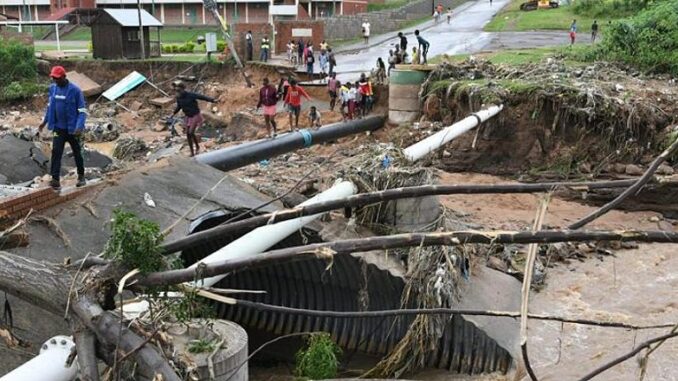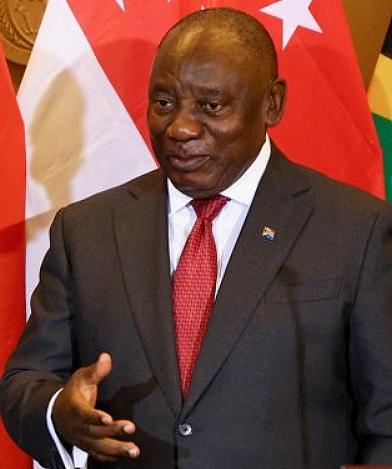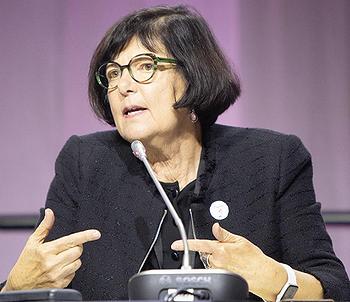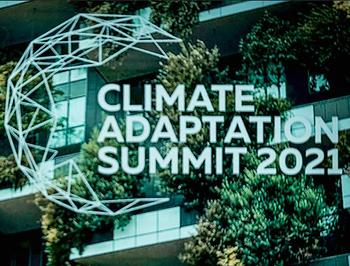
CAPE TOWN, South Africa, November 6, 2023 (ENS) – South Africa’s National Assembly has passed the country’s first Climate Change Bill over objections from two political parties – the far-left Economic Freedom Fighters and the conservative African Christian Democratic Party.
South Africa depends on coal for 80 percent of its electricity, and the country was one of the world’s most carbon-intensive major economies in 2022, producing 709 grams of the greenhouse gas carbon dioxide per kilowatt hour of energy.
The Climate Change Bill, passed by the directly-elected House of Parliament on October 24, seeks to ensure the development of an effective climate change response and a long term, just transition to a low-carbon and climate-resilient economy and society.
The bill also seeks to provide for a coordinated response by the three spheres of government – national, provincial, and local.
The legislation requires all levels of government to integrate their policies and strategies to address climate risks.

A Presidential Climate Commission to promote collaboration among stakeholders was created by President Cyril Ramaphosa in 2020.
Composed of government ministers and other social stakeholders appointed by President Ramaphosa to oversee South Africa’s response to climate change, the Commission monitors and reviews the country’s progress in reducing emissions – shifting from burning fossil fuels and adapting to forms of green energy without leading to job losses as part of the just transition programme.
The Presidential Climate Commission is supposed to function as a platform for diverse stakeholders to participate in meaningful dialogue and joint action. By promoting collaboration among communities, organized labor, businesses, and civil society, the Commission seeks to devise innovative solutions to the intricate, multi-layered problem of climate change.
South Africa is being devastated by climate disasters more often these days. In 2022, floods in the province of KwaZulu-Natal killed 435 people, and in 2017, Cape Town, a city of 4.8 million residents, almost ran out of water due to a severe drought.
During the period 1900-2017, more than 100 disaster events were reported, resulting in 2,200 deaths. At least 21 million people were affected and monetary losses amounted to roughly US$4.5 billion.

When she opened the parliamentary debate this October, Forestry, Fisheries and Environment Minister Barbara Creecy, a member of the Presidential Climate Commission, told the National Assembly that the debate marked an important milestone in the country’s common battle against climate change.
“Today, this House will complete the first stage in ensuring our country has a legal instrument to build resilience to the impacts of climate change and reduce emissions that is in a way that is appropriate to our national circumstances and development pathway,” she said.
“The sixth report on the International [sic] Panel on Climate Change shows us that the world is already dangerously close to an average temperature increase of 1.5 degrees above pre-industrial times. We must move with speed to reduce carbon emissions to limit the severity of climate change impacts,” Creecy told fellow lawmakers.
Creecy was referring to the Sixth Assessment Report of the United Nations Intergovernmental Panel on Climate Change released in March.
South Africa relies on coal for 80 percent of its electricity. Politically, the priority for the electricity sector has been to tackle rolling blackouts, called load shedding, and state-owned utility Eskom’s debt.
In an effort to limit climate change, South Africa has had a carbon tax for the past five years. In May 2019, President Cyril Ramaphosa signed the country’s first carbon tax into law.
The Carbon Tax Act gives effect to the polluter-pays-principle for large emitters and helps to ensure that firms and consumers take the negative adverse costs into account in their future production, consumption and investment decisions. Firms are incentivized towards adopting cleaner technologies
Now the Ramaphosa government is taking the next step toward curbing climate change.
Introduced in the South African Parliament in 2022, the Climate Change Bill is the first piece of legislation in the country specifically aimed at mitigating and addressing the effects of climate change.
The bill’s objective is to establish a strategy for addressing climate change and implementing a fair, long-term energy transition plan, and ultimately fostering a low-carbon, climate-resilient economy in South Africa.
Kgosientso Ramokgopa, South Africa’s minister responsible for electricity, told the National Assembly on July 11, “The national energy crisis continues to be the single biggest existential challenges in postapartheid South Africa. We must continue to harness all efforts to arrest further haemorrhaging caused by load shedding to our economy and the degradation of the quality of lives of ordinary South Africans.”
Ramokgopa, who heads the Ministry in the Presidency for Electricity, calls the ministry, “the focal co-ordinating point for the multidisciplinary and whole of society response to ending load shedding.”
The South African energy crisis or load shedding is an ongoing period of widespread national blackouts of the electricity supply. It began in 2007 towards the end of Thabo Mbeki’s second term as president, and continues to the present day.
Referring to Eskom, the government-owned company that is South Africa’s main supplier of electric power and the largest provider in Africa, generating nearly half the electricity used on the continent, Ramokgopa told the National Assembly, “We are restoring Eskom to higher levels of operational efficiency and looking into transmission financing options to expand and strengthen the grid to support South Africa’s new energy generation sources and guarantee energy security.”
“Weaponizing the Climate”
The objections to the Climate Change Bill from the conservative African Christian Democratic Party were expressed by Wayne Thring, MP, ACDP deputy president, in the National Assembly on October 24. He complained, “Much of the pressure to develop legislation regarding greenhouse gas emissions, comes from the developed world, who during their period of industrialisation paid scant regard to our environment, and still continue to emit the lion’s share of pollutants. Now they seek to negate the industrialisation of developing nations by weaponizing the climate, through legislation.”

“The European Union, as an example, will introduce a Carbon Border Adjustment Mechanism, a carbon border tax on embedded greenhouse gas emissions of carbon-intensive products imported into the EU. Simultaneously, they ask South Africa to shut down coal powered electricity stations, while hypocritically, our coal exports to the EU have increased by over 720% recently,” MP Thring told fellow lawmakers.
“To please the masters that pull the finance strings, the ruling party decommissioned the Komati coal fired power station, one of the most stable and efficient electricity power stations in South Africa, and that, during severe loadshedding,” MP Thring said.
“The USA has 220 coal-fired power stations, while India has 285. China, with 3092 coal-fired power plants, built two coal power stations per week, last year. South Africa has 14 coal power stations, an energy crisis, high unemployment, poverty, and inequality,” said Thring.
“This bill gives the Minister almost unfettered power to, among others, make regulations in relation to the management of climate change response, including the determination, review, revision, compliance with and enforcement of an allocated carbon budget,” he argued.
“The ACDP calls on this house to place South Africans and our economy first. We must have a balanced energy mix, using our abundant coal and fossil fuels, for the benefit of the unemployed and indigent among us, and do so responsibly, using clean coal technology,” Thring declared.
The Economic Freedom Fighters, which calls itself “a radical and militant economic emancipation movement,” has made no formal comment on the Climate Change Bill.
Seeking to manage climate change adaptation to impacts such as flooding, drought, wildfires, excessive heat, and water and food insecurity, the Climate Change Bill provides that government, at provincial and national levels, is obliged to assess all the risks and expected impacts and create response plans.
The bill also defines responsibilities for different national, provincial, and local governments, ensuring that all relevant role-players are mandated to do their part in responding to climate change and work together effectively.
The bill is intended to ensure that the country is empowered to respond adequately and safely to climate change and its risks and impact. It seeks to regulate climate change mitigation through the reduction of greenhouse gas carbon emissions.
According to the bill, the minister responsible for the environment must assign carbon budgets to companies to limit their carbon emissions.
The Climate Change Bill will now be sent to the other House of Parliament, the National Council of Provinces, for its concurrence to ensure that provincial interests are taken into account. If both Houses pass the bill, it will go to the President to be signed into law.
Rich Countries Set Aside $8.5 Billion for South Africa
At the 2021 UN Climate Change Conference in Glasgow, Scotland, COP26, the United States joined Britain, France, Germany and the European Union to offer a multi-billion dollar Just Energy Transition Partnership package to help South Africa accelerate a transition from coal.
But President Cyril Ramaphosa said at the time that South Africa will only accept the US$8.5 billion in initial funding pledged by rich nations to help it shift from coal to greener energy if the terms suit national goals such as debt reduction and job creation.
In October 2022, South Africa’s cabinet approved an investment plan for the $8.5 billion package to accelerate the country’s transition from coal to clean energy. Less than three percent of the money will be delivered as grants, with the rest split between concessional and commercial loans.
The investment plan is expected to cover the closure and repurposing of coal-fired power plants by Eskom, expansion of the transmission network and social protection and retraining for workers who lose their jobs.
Some of the funding will go towards electric vehicle manufacturing and the development of green hydrogen.
But clean energy campaigners worry that the commercial loans will add to South Africa’s debt and leave workers poorer than they were before the funding.
“The terms have to be fair finance. They have to reduce the debt load,” Saliem Fakir, executive director of the African Climate Foundation, said.
The African Climate Foundation believes that, “By anchoring South Africa’s climate change response in law, the government not only demonstrates its commitment to a purposeful and coordinated response but also gains the authority to implement more ambitious measures outlined in the nationally determined contribution, NDC…”
The NDC is a legally-binding commitment that each country makes to the United Nations Framework Convention on Climate Change that sets the country’s greenhouse gas emissions reduction targets.
For instance, South Africa is one of the few countries to have legislated for the imposition of sector-wide emission targets, in addition to private sector carbon budgets. This enables the Minister of Forestry, Fisheries, and the Environment to set emissions targets for sectors, such as energy and transport, as well as prescribe emission thresholds at a company level.
Last November, at the UN’s 2022 climate summit, COP27, President Ramaphosa said, “Our emphasis must be on the health, well-being and food and water security of the most vulnerable. At a national level, South Africa is fully committed to achieving the most ambitious end of the mitigation range in our updated Nationally Determined Contribution.”
“We are already scaling up investment in renewable energy, and are on course to retire several of our ageing coal-fired power plants by the end of 2030,” the South African President said.
Featured image: Heavy rainfall in April 2022 claimed more than 400 lives, caused billions worth of damage to critical infrastructure, and prompted the KwaZulu-Natal Provincial Government to issue an emergency declaration. April 11, 2022 (Photo courtesy Government of KwaZulu-Natal via Floodlist)



